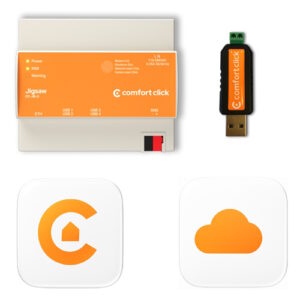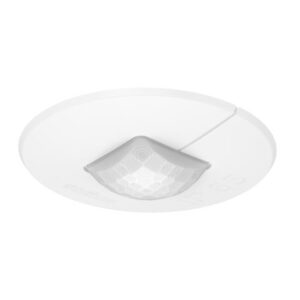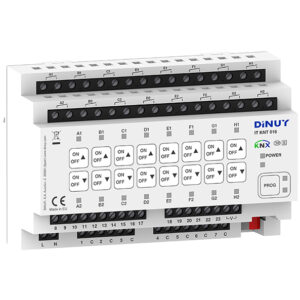The hospitality industry is evolving rapidly, and hotels are increasingly turning to smart technologies to offer personalized, efficient, and sustainable services. KNX, an open standard for home and building control, plays a critical role in hotel automation, transforming the guest experience while optimizing energy efficiency, security, and management processes. By leveraging KNX technology, hotels can implement seamless Guest Room Management Systems (GRMS) and centralized control systems that cater to the unique needs of both guests and hotel staff.
This article explores how KNX is used in hotel automation, highlighting key applications and the significant benefits that this technology brings to modern hotels.
Table of Contents
ToggleWhat is KNX Technology?
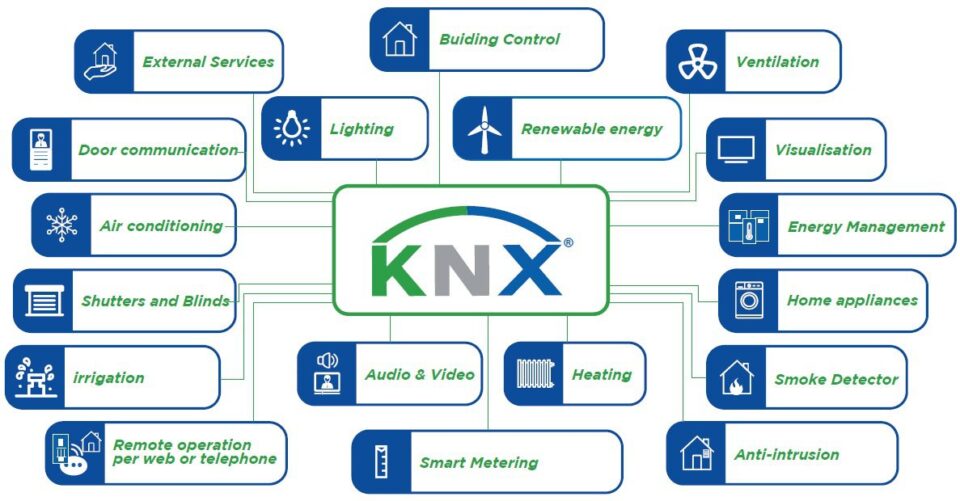
KNX is a worldwide standard for home and building automation, providing a robust and scalable platform for integrating various devices and systems. It allows for seamless communication between different components, such as lighting, HVAC (heating, ventilation, and air conditioning), blinds, security systems, and multimedia. The strength of KNX lies in its flexibility, as it can be applied to both residential and commercial settings, including hotels.
In hotel environments, KNX is the backbone of automation systems, providing centralized control over multiple aspects of the guest experience and hotel management. From controlling lighting and room temperature to managing security and energy consumption, KNX enables hotels to create smart environments that meet the expectations of today’s tech-savvy travelers.
Guest Room Management Systems (GRMS) with KNX
One of the most impactful applications of KNX technology in hotels is the Guest Room Management System (GRMS). GRMS refers to a set of automated functions in guest rooms that enhance comfort, convenience, and energy efficiency. Here’s how KNX technology powers GRMS:
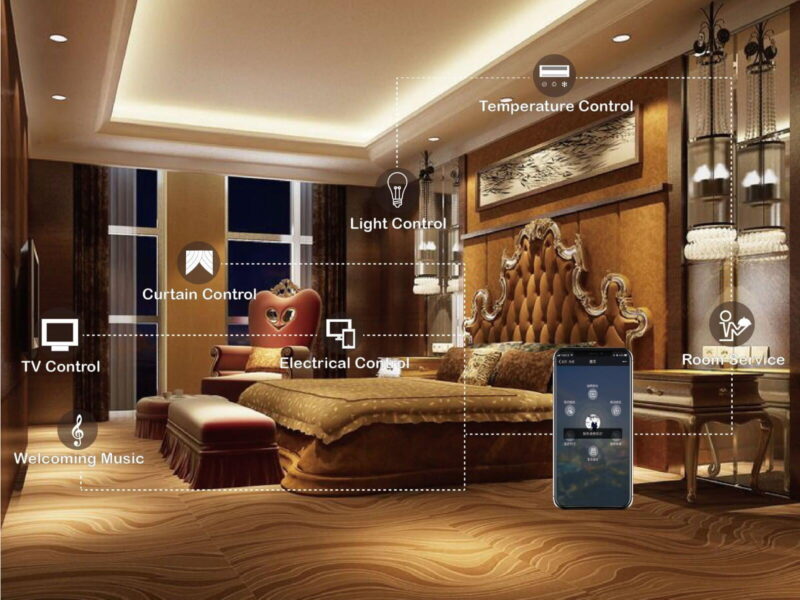
1. Smart Lighting Control
Lighting is an essential aspect of guest comfort, and KNX allows hotels to offer intuitive and personalized lighting experiences. Through a KNX-based GRMS, guests can adjust lighting scenarios with ease using wall-mounted control panels, mobile apps, or voice commands.
Additionally, hotels can implement energy-saving features, such as motion sensors that automatically adjust lighting based on occupancy. For instance, when a guest enters the room, the lights turn on at a welcoming brightness level, while unoccupied rooms remain in energy-saving mode.
2. Automated Climate Control
KNX-powered GRMS systems enable precise control over room temperature, ensuring that guests always feel comfortable. Smart thermostats, connected via KNX, allow guests to set their preferred temperature easily. The system can also be programmed to adjust the room’s climate before a guest’s arrival, providing an optimal environment the moment they walk in.
Incorporating occupancy detection and window contact sensors, KNX ensures that heating or air conditioning systems run only when necessary, reducing energy waste. For instance, if a guest opens a window, the HVAC system can automatically adjust or turn off to save energy.
3. Shading and Blind Control
KNX allows for the seamless integration of automated shading systems, giving guests the ability to control blinds or curtains using the same interface they use for lighting and temperature. This feature is especially useful in hotels with large windows or scenic views, as guests can control natural light without leaving their bed or desk.
Additionally, blinds can be programmed to work in tandem with the room’s temperature and lighting systems, creating a fully integrated environment. For example, blinds can be automatically closed during the hottest part of the day to reduce heat and minimize energy usage.
4. Scene Setting and Personalized Experiences
KNX systems enable the creation of custom scenes tailored to guest preferences. Guests can easily switch between pre-programmed modes like “Relax,” “Work,” or “Sleep,” where lighting, temperature, and shading are adjusted accordingly. This personalized experience increases guest satisfaction and adds a touch of luxury to their stay.
Hotels can also implement guest recognition systems through KNX, allowing the system to remember a guest’s preferences for future visits, offering a consistent experience every time they return.
Centralized Hotel Automation with KNX
Beyond individual room management, KNX technology also supports centralized control and monitoring across the entire hotel. This centralized system streamlines operations for hotel staff and management, offering numerous advantages:
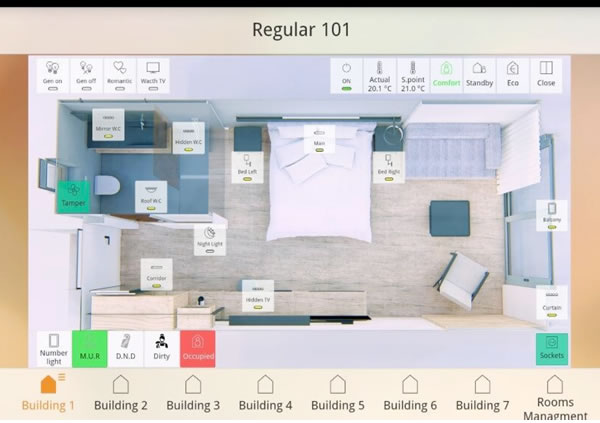
1. Energy Management and Sustainability
Energy efficiency is a top priority for modern hotels, both from an operational cost perspective and an environmental standpoint. KNX enables centralized control of lighting, HVAC, and shading across the entire building, allowing hotel managers to monitor and reduce energy consumption.
Through real-time data collection, the hotel can identify areas where energy is being wasted and take corrective actions. For instance, KNX systems can turn off lights in unoccupied corridors or common areas, optimize HVAC usage based on external weather conditions, and automate lighting and shading adjustments to minimize the need for artificial light.
2. Security and Access Control
KNX also integrates with security systems to provide a seamless experience for both guests and staff. Access control, for example, can be managed through the same centralized platform, allowing for automated room key generation and door locking systems.
Guests can use key cards, mobile apps, or even biometric systems to access their rooms. Meanwhile, hotel staff can monitor access points, control who enters restricted areas, and respond to security alerts in real-time, all through the KNX system.
In addition, KNX-based alarms, cameras, and surveillance systems can be integrated with the centralized platform, offering real-time monitoring and alerting capabilities to ensure the safety of both guests and property.
3. Maintenance and Monitoring
One of the critical aspects of hotel management is the continuous monitoring of various systems, such as lighting, HVAC, and water usage. KNX offers predictive maintenance by sending alerts when equipment requires servicing or replacement. For example, KNX systems can notify maintenance staff when a light bulb is about to fail or when an air conditioning unit needs cleaning.
This proactive approach minimizes downtime and ensures that systems run efficiently, improving the guest experience while reducing operational costs.
4. Integration with Other Hotel Management Systems
KNX systems are highly compatible with other hotel management platforms, including Property Management Systems (PMS), Building Management Systems (BMS), and Enterprise Resource Planning (ERP) systems. This integration enables seamless data exchange and comprehensive control, making it easier to manage bookings, guest preferences, energy usage, and maintenance schedules from a single interface.
By integrating KNX with other software systems, hotels can automate many administrative tasks, such as billing, room assignment, and housekeeping schedules. For instance, when a guest checks in, KNX can automatically adjust the room settings according to their preferences, saving time and enhancing the guest experience.
Improving the Guest Experience with KNX Automation

1. Personalized and Convenient Stay
The seamless integration of KNX technology allows hotels to provide a more personalized and convenient experience for their guests. From the moment guests check in, they can customize room settings to their liking. Whether it’s adjusting the lighting to match their mood, setting the temperature to a comfortable level, or controlling blinds and entertainment systems, KNX ensures everything is easily accessible through a centralized interface.
Moreover, the ability to remember guest preferences and automate room settings based on past visits makes repeat customers feel valued and enhances loyalty.
2. Streamlined Communication and Service Delivery
KNX can integrate with in-room communication systems, allowing guests to request room service, housekeeping, or maintenance directly through the control panel or mobile app. This integration streamlines communication between guests and hotel staff, ensuring prompt responses to requests and enhancing the overall experience.
Additionally, KNX-based systems can provide real-time information on local attractions, dining options, and hotel amenities, improving guest satisfaction and encouraging the use of hotel services.
3. Enhanced Safety and Security
With integrated KNX security systems, hotels can offer guests peace of mind. Room access can be controlled remotely, and security alerts can be sent to both guests and staff in the event of an emergency. Moreover, KNX enables the implementation of automatic fire safety measures, such as unlocking emergency exits and activating sprinklers, ensuring a high level of safety compliance.
The Future of KNX in Hotel Automation
As the hospitality industry continues to embrace smart technologies, the demand for integrated, scalable, and energy-efficient solutions like KNX will only grow. Future developments may include deeper integration with artificial intelligence (AI) and the Internet of Things (IoT), enabling predictive and self-learning systems that further enhance the guest experience.
For instance, AI-driven KNX systems could analyze guest behavior and automatically adjust room settings without any input. Similarly, IoT-enabled sensors and devices could offer more granular control over energy usage and maintenance.
Hotels that invest in KNX technology today are not only improving their operational efficiency but also positioning themselves as leaders in sustainability and guest satisfaction.
Conclusion
The application of KNX technology in hotel automation offers numerous benefits, from personalized Guest Room Management Systems (GRMS) to centralized control over energy, security, and maintenance. By adopting KNX, hotels can provide guests with an enhanced, comfortable, and secure stay while also streamlining their internal operations and reducing energy consumption.
As more hotels adopt smart building technologies, KNX will continue to be a cornerstone in creating the intelligent, responsive, and sustainable hotel environments that guests expect.
-
-
CYTECH C-BUS TO KNX 2-WAY TRANSLATOR – Brilliant
$607.18 (ex. GST)Please login to see trade price
Add to cart -
-
STEINEL 064129 IR QUATTRO Micro KNX Presence Detector
$264.45 (ex. GST)Please login to see trade price
Add to cart -
DINUY IT KNT 16 channel Switching Actuator
$826.27 (ex. GST)Please login to see trade price
Add to cart -
Jigsaw KNX Pro (3 Users) – Brilliant
$2,581.82 (ex. GST)Please login to see trade price
Add to cart

